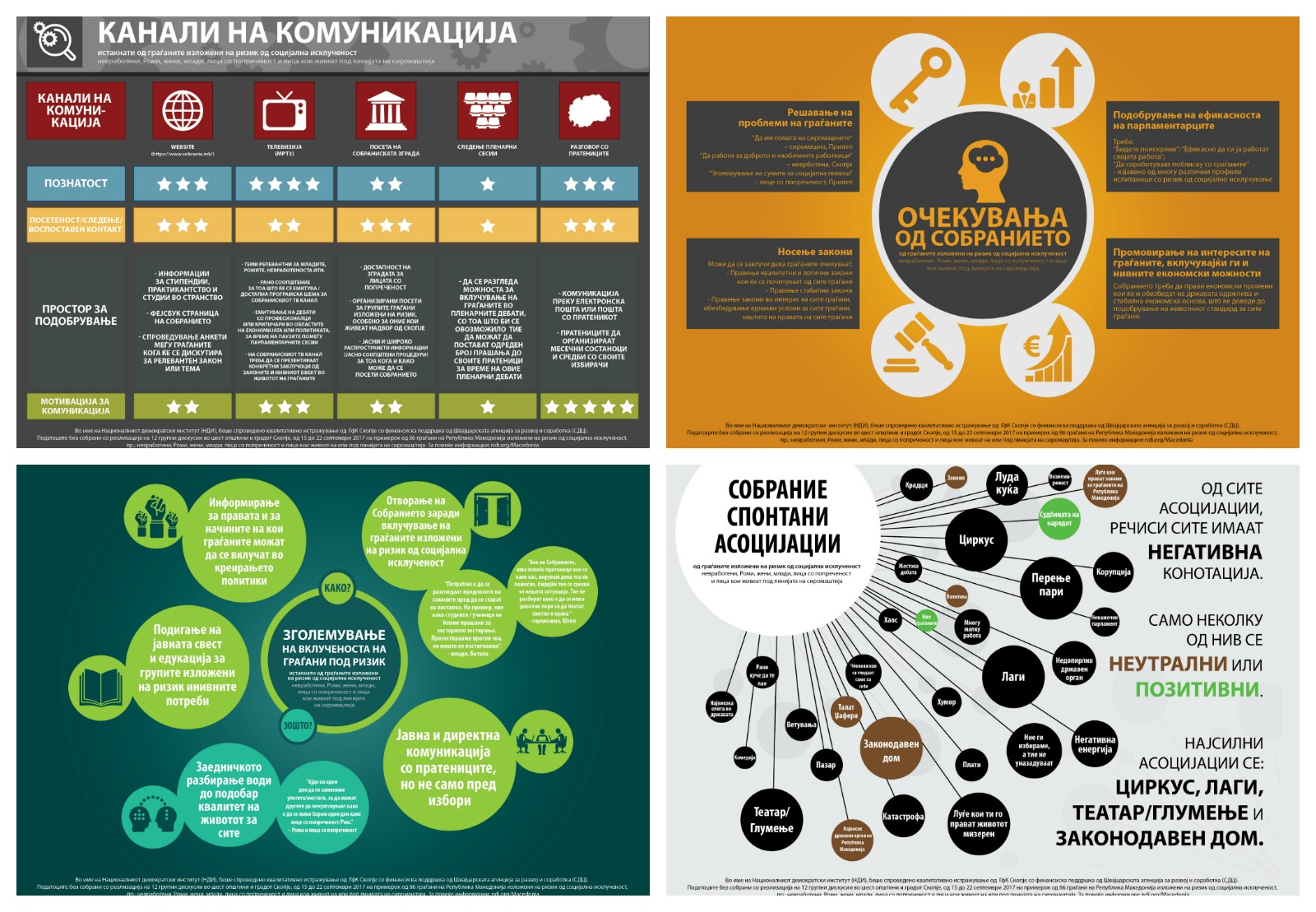
Examples of infographics created from the focus group results in Macedonia
SHARE
Citizens At-Risk of Social Exclusion Expect More Transparency, Accountability and Support from Parliamentarians, Believe in Civic Engagement and the Importance of Advocacy Groups
Macedonia has recently undergone a change in government at both the national and local levels, in large part due to a wiretapping scandal alleging abuse of power, corruption and clientelism, which led to a political standoff between the two largest parties in Macedonia. These allegations are currently being investigated by a special prosecutor. Intervention by the United States and the European Union diffused some of the tensions, precipitating early parliamentary elections and the ensuing local elections. The leadership of the Assembly of the Republic of Macedonia, the country’s parliament, have expressed a commitment to greater openness and transparency in the wake of the scandal.
I am 25 years old and I depend on my mother’s pension. Wherever I try to look for a job it becomes clear that politics is involved and "connections" (nepotism) prevail.
– Female, unemployed, Skopje
To support the Parliament’s efforts, NDI conducted qualitative research focusing on the specific needs of groups at risk for social exclusion. The perceptions of these groups often indicate how well a public institution serves the whole community. Therefore, focus groups included six targeted at-risk groups, including the unemployed, youth, Roma, women, people with disabilities and people living below the poverty line, and assessed their perception of Parliament’s openness and transparency.
Main Challenges
According to the qualitative research, economic and social issues are the main challenges these vulnerable groups of citizens face. As a result, they have a negative assessment of the overall socio-economic situation in Macedonia. Participants identified the following problems:
- Low household income
- No employment possibilities
- Very low salaries
- Young people leaving the country
- Poor education system
- Inadequate social care benefits
- Discrimination
Perceptions of Parliament
The respondents predominantly believe that inefficient parliamentarians only support their own political party interests. They overwhelmingly believe that Parliament should work on promoting the interests of citizens and improving the economy, but that it does not. They expect Parliament to work on solving citizens’ problems and to focus on passing “stable, efficient, and quality laws."
Parliament is a place where political parties fight.
- Roma, Stip
We have many laws on paper and on paper everything looks perfect, but unfortunately, in real life and in practice everything is a disaster.
– Woman, Kumanovo
Outreach Mechanisms
The research respondents are mainly familiar with the publicly-funded television channel which broadcasts the Parliament’s sessions; however, they are less familiar with other outreach mechanisms to communicate with parliamentarians, such as the Parliament’s web page and the ability for direct communication with parliamentarians. They are almost completely unaware of options like visiting the Parliament and watching the sessions from the visitor’s gallery.
It is necessary to review proposals for laws before they get enacted. For example, we as students/pupils were not asked whether we wanted standardized tests administered. We protested against it but we did not achieve anything.
– Youth, Bitola
Generally, participants perceive Macedonia’s Parliament as transparent, since anyone who wants to can directly follow the sessions via television. Nevertheless, citizens do not consider the Parliament to be open to them.
Since they believe that the parliamentarians they elected should represent their interests the Parliament would like to improve the legislative body’s openness. In particular, they suggest more widely available and clearer r information about how citizens can get involved.
Civic Engagement
To better help them engage in policy-making processes, citizens at-risk of social exclusion recommend that Parliament:
- Inform citizens on how they can get involved
- Encourage citizen input in law changes
- Promote youth activism
- Make issue-based “lobbying” easier
- Include a higher representation of Roma and people with disabilities in Parliament and other government institutions
- Publish educational information about the needs of vulnerable groups
- Encourage more active civic engagement through non-governmental organizations and unions
- Should encourage MPs to have more direct communication with citizens
- Establish working groups that include vulnerable groups of citizens in the Parliament.
Methodology
If people with disabilities were included everywhere, we would not be invisible as we are now. The others would be able to see us, acknowledge our problems and help us.
– Person with a disability, Skopje
GfK Skopje conducted this qualitative research on behalf of NDI with financial support from the Swiss Agency for Development and Cooperation (SDC). The view expressed herein do not necessarily reflect those of the SDC. The data was collected through 12 group discussions in six municipalities and the City of Skopje from September 15-22, 2017, using a sample of 86 citizens from the Republic of Macedonia at-risk of social exclusion.
For the qualitative research analysis, presentation and infographics, visit: http://bit.ly/2EonfOd.


